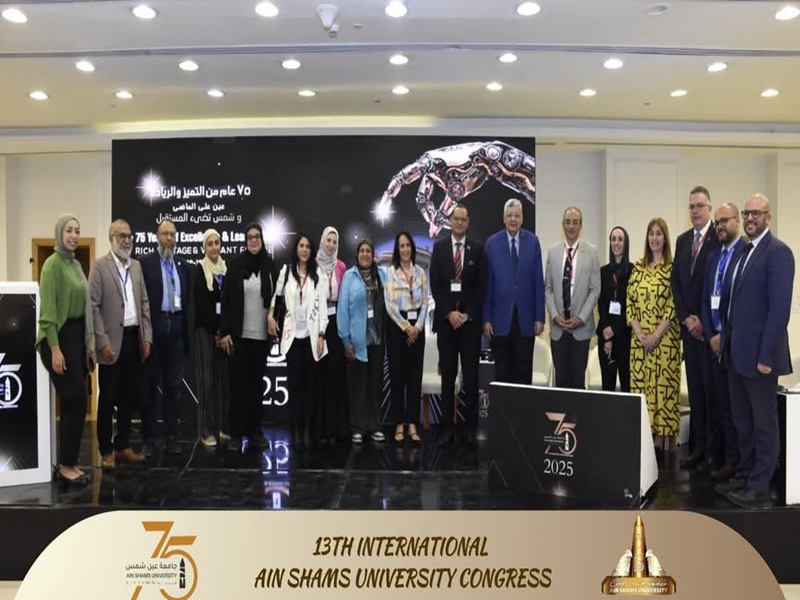The Presidential Health Advisor and the President of Ain Shams University Inaugurate the Second Scientific Session: "Artificial Intelligence and Digital Transformation in University Hospitals" as Part of the 13th Annual International Conference Activities
Prof. Awad Tag El-Din, Presidential Advisor for Health and Prevention, and Prof. Mohamed Diaa Zain El-Abedeen, President of Ain Shams University, inaugurated the second scientific session of the 13th Annual International Conference of Ain Shams University, in the presence of a distinguished group of professors and experts from various academic and medical fields, and with broad participation from researchers and stakeholders in scientific and research affairs.
In his address, Dr. Tag El-Din emphasized that the Medical Liability Law serves as a cornerstone for protecting medical staff and institutions from any form of assault or vandalism, while simultaneously safeguarding patient rights against medical errors. He stressed that the attending physician is always the most concerned with the patient’s safety, and that there is often confusion between medical error and complications that may arise despite adherence to proper procedures.
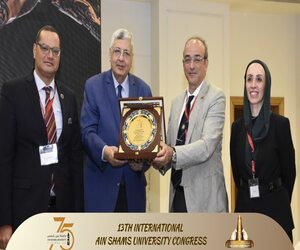 |
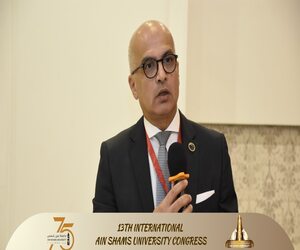 |
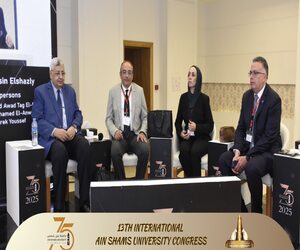 |
||
He also highlighted the rapid advancement in the use of artificial intelligence within the healthcare sector, noting that the human relationship between doctor and patient remains far more significant than any technical or automated report. “AI cannot replace human diagnosis. Despite the precision of robotic surgeries, medical decisions must remain in human hands,” he stated. Dr. Tag El-Din also referred to emerging challenges driven by technological progress, such as the protection of medical confidentiality and the identification of new diseases through advanced diagnostic tools.
He praised the “remarkable progress” of Ain Shams University Hospitals in terms of the number of facilities, intensive care units, and specialized treatment centers, affirming that “whatever is new in the world, Ain Shams University Hospitals were among the first to adopt it in Egypt.” He concluded by affirming that the current digital and legislative transformation reflects a clear legislative revolution and strong support from the political leadership, which prioritizes Egyptian citizens’ health and medical personnel rights as integral parts of the human rights framework.
In alignment with the national strategy to reform the healthcare system and achieve the goals of Egypt Vision 2035, Prof. Tarek Youssef, Executive Director of Ain Shams University Hospitals, presented a comprehensive overview of the university’s national medical city projects. He traced the historical evolution of the university’s hospitals, beginning with a donation by nationalist Abdel Rahim Pasha El-Demerdash, who laid the foundation of the medical city, to the recent inauguration of new projects reflecting massive expansion in services and infrastructure.
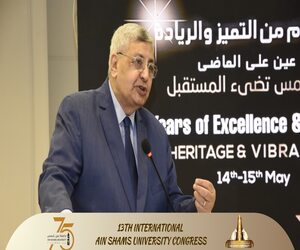 |
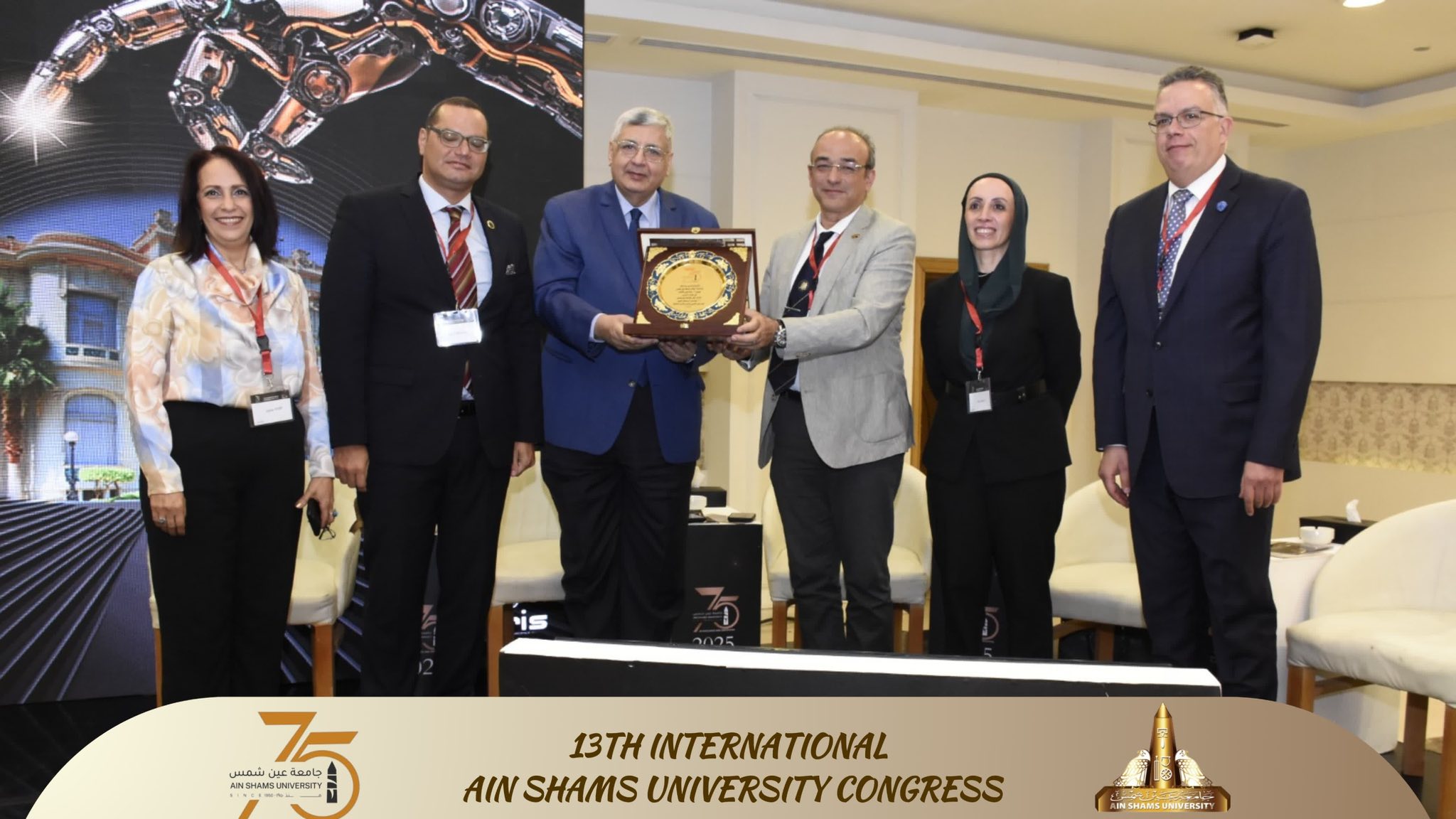 |
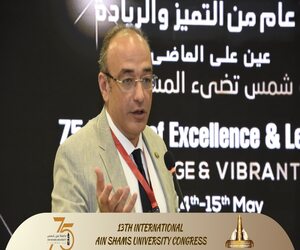 |
||
He noted that the current system comprises numerous hospitals and specialized medical centers, in addition to core departments covering all medical specialties. The presentation spotlighted the accreditation of the Geriatric Hospital and El-Obour Hospital as reference healthcare institutions delivering advanced services. It also highlighted the signing of several key protocols with various entities, paving the way for enhanced cooperation and new horizons for the development of healthcare, education, and research.
These projects embody Ain Shams University’s ambition to become a regional and international medical hub, in line with the state’s vision for health sector advancement and quality-of-life enhancement. The hospitals are currently expanding intensive care units and opening new advanced departments equipped with cutting-edge medical technologies to meet the growing needs of critically ill patients, while modernizing critical care infrastructure and integrating it into a unified central system to enhance response speed and efficiency.
The session also featured Prof. Yassin El-Shazly, Vice Dean of the Faculty of Law for Postgraduate Studies and Research, who stressed the importance of interdisciplinary collaboration between law and medicine. He underscored the need for a comprehensive legislative system that ensures a fair balance between the rights of doctors and patients and protects both service providers and recipients within the therapeutic relationship.
The Medical Liability and Patient Safety Law was presented as a vital step toward achieving this balance. It addresses the general principles of medical liability and outlines the legal frameworks governing the practices of doctors and healthcare professionals. The law also clearly distinguishes between types of medical errors—categorizing them into gross negligence, ordinary error, and errors leading to involuntary manslaughter—and defines medical complications in legal terms, differentiating them from errors that require accountability, as well as unintentional professional mistakes that exempt practitioners from liability.
Dr. El-Shazly emphasized that technological advances in healthcare must be paralleled by legislative modernization to ensure justice, protect all parties’ rights, and prioritize patient safety.
Prof. Aya Yassin, Director of the Center of Excellence for Artificial Intelligence in the Medical Sector at Ain Shams University, presented a brief overview of the center. She highlighted it as one of the university’s strategic initiatives to foster research and development in AI applications for healthcare. The center aims to develop digital medical solutions that enhance healthcare quality and support medical decision-making through data analysis and the application of advanced machine learning techniques, thereby improving diagnostic accuracy and management of critical cases.
Similarly, Prof. Ahmed Samir, Professor of Diagnostic Radiology, spoke about the rapid development of AI in radiology. He noted that AI has become a key partner in improving the accuracy and speed of diagnosis, particularly in interpreting radiological images. He emphasized that over the past 15 years, radiological equipment has seen significant improvements in quality, speed, and precision, and that physicians remain essential in reviewing AI outputs and comparing them with clinical evaluations to ensure the highest standards of accuracy and reliability.
Dr. Sahar Khalil, Director of the Digital Transformation Program at University Hospitals, stated during her presentation that the digitalization of university hospitals is part of a comprehensive national plan to upgrade all university hospitals in Egypt within a modernized healthcare vision. She emphasized that digital transformation directly improves patient satisfaction by streamlining workflow and reducing waiting times. Now, patients can electronically access test results, medical consultations, and billing services—reducing the need for physical movement within the hospital and allowing for smoother service delivery.
She also explained that the implementation of a queue management system enables precise monitoring and continuous improvement of outpatient waiting times, resulting in a more transparent and organized experience in waiting areas. “Previously, measuring waiting times required significant effort and time, but today, thanks to digital systems, this task is accomplished with ease,” she added. The system has significantly improved patient satisfaction by enabling clearer and more effective scheduling. This digital shift reflects the state’s commitment to enhancing the quality of healthcare services and creating a more efficient and advanced medical environment.
Dr. Dina El-Samman, Lecturer and Consultant of Pathology at the Faculty of Medicine, Ain Shams University, discussed the growing potential of AI in digital databases, particularly in the medical field. She explained that these technologies are revolutionizing the collection and analysis of clinical data. Digital data libraries now go beyond traditional text storage, incorporating multimodal clinical information—including medical images, diagnostic reports, and test results—into integrated patient data sets.
She emphasized that AI-supported systems facilitate research and analysis and support evidence-based medical decision-making, which contributes to improved healthcare quality and accelerates clinical research.
This session forms part of a comprehensive conference agenda that addresses key scientific and practical issues, with this year’s focus on digital transformation, smart healthcare, and interdisciplinary integration, aligning with Egypt’s national vision for promoting innovation and sustainable development in academic institutions.
Attendees confirmed that the conference reflects Ain Shams University’s pioneering role in supporting scientific research and providing an effective platform for knowledge and expertise exchange between Egyptian and international universities.
The session concluded with a commemorative shield presented to Professor Dr. Awad Tag El-Din, in recognition of his contributions, on the occasion of the 75th anniversary of the university’s establishment.


.svg)

